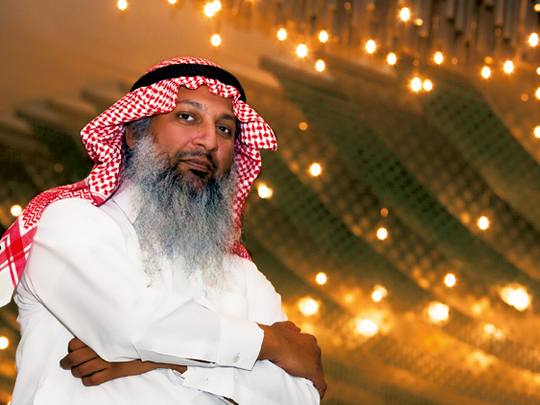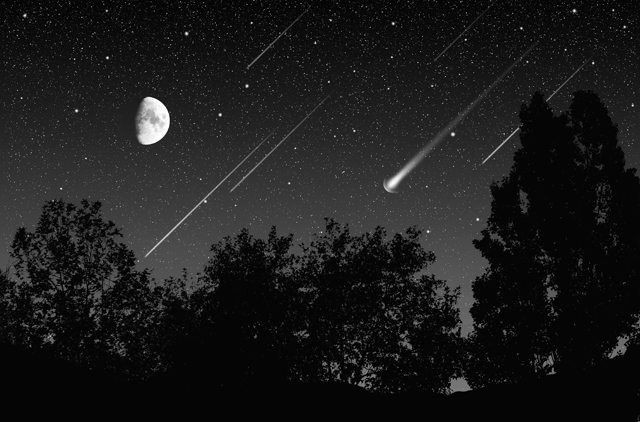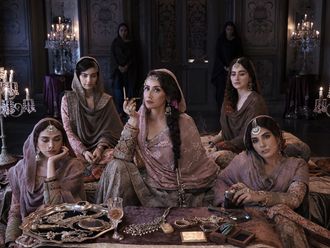
The year was 1993. Hasan Ahmed Al Hariri was extremely pleased. He, along with a small group of like-minded people, had just formed the Dubai Astronomy Group (DAG) and the group was looking forward to one of its first public functions.
A substantial sum of money had been spent on advertising the event, invitations had been sent out to many people for a free stargazing session followed by a lavish dinner.
"Can you imagine our disappointment then when only one person turned up for the function?" says Al Hariri. "Just one person! And here we were, 14 members of the core group, looking forward to our first real social engagement.
"We had worked really hard to organise it and were expecting at least a 100 people to attend." Instead they ended up with a lone guest.
Fast forward to 2010.
"For the recent Persieds meteor shower event that was held on August 12, at Bab Al Shams, all I had to do was spread the news by word of mouth and we had 600 people show up," says Al Hariri.
***
Stargazing as a hobby has always been a magnet for people across the world. Today in the UAE, there are at least four amateur astronomy groups in Dubai and Abu Dhabi and many stargazing events are regularly publicised.
"Astronomy is my life," says Hariri whose fascination for the stars began when he was 14 after his elder brother Mohammad gave him a book on the subject. It had stunning pictures of the solar system - a rarity as school books of the early Seventies did not contain many glossy pictures. So enamoured was Hariri by what he saw in the book that he dashed off a series of queries to Nasa on all things concerning the stars and the skies.
His effort did not go in vain. He was rewarded with 34 glossy books on each of the questions he had sent them - about spacecraft missions, Nasa's Voyager Mission, on computer languages, jet propulsion...
"Those books were so comprehensive that they really made my career," says Hariri, who went on do his masters in Telecommunications from Colorado University in the US.
However, the lure of the stars was too strong to ignore and what had started as a hobby soon culminated into a full-time passion for Hariri. It did not take him long to quit his job as a telecommunications engineer. He also gave up the daily supervision of his IT business to pursue astronomy and in 1993, Hariri founded the Dubai Astronomy Group with just 14 members.
Over the past 17 years he has worked hard to build the foundation for an interest in astronomy in the UAE by holding seminars, investing in equipment and educational courses. Today the DAG boasts of over 1,700 members.
Strengthening bonds
"Astronomy as a hobby needs no investment to begin with,'' says Al Hariri. "Of course you can invest in the most expensive equipment if you have the budget for it, but even without money, your pair of eyes is enough to get you started. It is a great pursuit for family bonding," says Hariri who has six children all of whom share their father's passion for the stars.
Astronomy is something that was of great interest to his forefathers as well, he says. "I still remember that my grandfather could tell the exact time, date, month and season without using a watch or a calendar. All he needed was to study the heavenly bodies. Such was the interest in astronomy during those times."
However, thanks to the internet and video games people have become isolated and socially dull, says Hariri. But a creative hobby like astronomy that thrives on conversation and discussion inspires the kind of excitement that invariably leaves people with a buzz, he says.
Every time he plans to take off into the desert to watch the stars, his children insist on accompanying him. Stars and planets have become an exciting talking point between them, bridging the generation gap seamlessly. It is important to share the fascinating experience of studying the stars with those who are close to you, he says.
It was this love for stargazing that brought his extended family closer. With busy schedules making each unit of the extended family spend time on their own, the initial moves to get together and head out for a spot of star gazing worked wonders in drawing them together.
Hariri says he quite literally rediscovered the extent of his extended family - of five brothers and their families - through their common love for this hobby. "We all used to meet practically only on festive occasions. However, now that we go out on field trips I have realised that there are at least 40 members in my extended family!"
Amazing experiences
Hariri talks of the boundless joys of stargazing. "It is such a mesmerising experience to simply look up and see the stars, the Milky Way... It provides a down-to-earth perspective on our place in the universe and also lets us know that we are not alone." He cites the instance of once witnessing a meteor shower with his family members which "was amazingly beautiful''.
"The meteor shower lasted for 30 seconds and was visible in the sky as a greenish blue light. It was such a wondrous sight, the kind I feel you need to share with those you love."
So strong is his love for the stars that he is always ready to take anyone on a star gazing session. These days a telescope is a permanent fixture in his car. "I am ready to take people out on the slightest pretext. It is good to bond over a discussion about a particular constellation or the Milky Way,'' he says.
A social communication tool
Just as astronomy is strengthening the ties between his extended family, it is also building bonds between the group Hariri set up and the international astronomical community. "There can be no astronomy without communication and we at DAG have discovered that we are bonding with the international astronomical community over our common interests,'' says Hariri.
"DAG has linked up with international astronomy groups in Fiji Islands, Venezuela, Chile, the United States. We also exchage details of our watch time (where we watch the same phenomenon from different parts of the world) and share notes," he says.
Membership to DAG is easy. The basic membership, called ‘friendship' membership, is free. All you need to do is log on to the website (www.dubaiastronomygroup.com) and click on the ‘register to enrol' icon. ‘Friendship' members are allowed to participate in the free astronomy events organised by DAG. They can also avail of discounts on services and courses offered by the group.
Says Hariri, "Apart from the Friendship membership, we have three other categories.
1 Honorary membership This is open only to those who have contributed to the progress and development of astronomy.
2 Professional membership This is available to those who pay $200 per year and get involved in training and event management and also execute projects with DAG. They also get to enjoy all other benefits available to standard members.
3 Standard membership For a fee of $100 per year, these member can participate in all DAG general events and are eligible for gifts. They can also use some of the resources of the group.
"Once you log on to the website, you will instantly be able to access the detailed celestial events calendar for the whole year, invites to sky gazing events, information on courses of astral photography, basic training in astronomy and other information on lectures, workshops and camps being held throughout the year for different age groups.
"You can also visit the group at the Dubai centres where you will be allowed to use the telescopes for stargazing. The DAG has a permanent camp in Ras Al Khaimah offering residential stargazing lectures and demonstrations for those serious about their hobby."
The DAG organises lectures, workshops, astral photography courses (for a fee) and sky-gazing events such as lunar and solar eclipses, comet tracking, etc. Viewing of meteor showers are arranged for free, much in the spirit of being out at a night-time carnival!
A financially viable hobby
Astronomy can be a hugely satisfying and financially successful hobby if you have a yen for spending hours studying the sky. Take the case of amateur British astronomer, Nick Howes. Howes happened to train his telescopic camera in March this year on the icy nucleus of comet C2007 C3 on its outward journey away from the sun. The set of six pictures he clicked is being praised as the most exciting images of the year!
You can easily make a living out of your hobby if you get trained in astral photography courses offered at DAG.
Since the sky is not the limit to what you can discover, astronomy offers much by the way of exciting breakthroughs. Till recently, many people used to confuse astronomy with astrology believing that the former is all hocus pocus with astronomers making wild predictions. But that is not true.
"Astronomy is a science based on exact calculations, periodicity and angles. Astronomers who tell you about a new constellation or star are not inventing these things. The celestial bodies were always present in the universe. All they are doing is simply discovering what has always existed," he says.
Where and when to go for sky gazing.
For important events-in-the-sky during the year DAG organises trips to their camp in the deserts of Ras Al Khaimah or to other popular desert resorts such as Bab Al Shams. It is important to head away from the city lights for a clear view of the skies. "During my childhood, Dubai skies were less lit up with city lights and one had a clear view of the stars from anywhere as night fell." One of the most rewarding places to stargaze in the UAE is a desert section called Siha Salam and Margham, between the Dubai and Sharjah borders, he says.
- How to choose a telescope
There is an interesting tale to how Hariri got his first basic telescope. So passionate was he about astronomy as a teenager that he requested his father to buy him a telescope. Astronomy being a very recent hobby for him then, his father failed to comprehend the depth of his passion. So Hariri entered a general knowledge competition of a local Television channel and won a Dh100 prize which he promptly invested in a telescope. However if you are beginner, you can save this expense by sharing the resources at DAG.
If however, you are keen on investing in a telescope, make a detailed technical survey of the models existing in market before taking the decision. "Telescopes can cost you a few thousand bucks to upwards of Dh10,000. You have to keep in mind that your basic need is to ensure that the image you are looking at is well magnified, clear and bright," says Hariri. It is a tricky investment to make and you require detailed knowledge of optics, lenses, refractors, the mounts, etc. On their website you can navigate to a section which provides detailed information on how to choose the best telescope to suit your needs. The section carries diagrams of different sections of a telescope and Hariri says a new entrant can take the advice of members to get the correct information before he makes the decision.
If you are looking for basic telescopes, DAG has four different kits that you can purchase according to age group specification:
1. Age group 7-10: A primary kit where a child can build a telescope with the help of DAG members
2. Age group 11-15: A set of binoculars with advanced books and journals on astronomy
3. Age group 16-20: a good telescope, assignments to do, objectives set, a syllabus to follow and at the end of utilising the kit, a goal has to be achieved. The basic of astronomy are provided here - details about the galaxies, known facts about the universe, the stars and the planets are provided. DAG also teaches them how to select the right instruments and how to conduct advance experiments. The kit has been designed in a manner that it does not require a trainer.
4. Age group 20 onwards. This kit is meant for adults who are serious about their intentions to be amateur astronomers and want to invest time and money in their hobby. This kit has programmes tailored according to the interest of a person. The person has to meet Hariri and specify what he intends to work on. Based on this feedback, the right kind of instrument has to be selected.
"We do not want people to invest in telescopes as these are expensive instruments and one must have enough knowledge about optics and mounts to be able to choose the correct instrument." Hariri advises people to use the assets of DAG, enrol for workshops before taking the leap.
Do's and Dont's
Do's
- Gaze at the sky each day. It is great observational experience.
- Join a like-minded group.
- Maintain a regular calendar for observation of celestial happenings.
- Pool resources with another individual or a group to buy a basic telescope thereby economising costs.
- Record your observations.
- Read up about your area of interest and know what is it you are looking for - is it the constellations, the satellites, our galaxy, a particular star? Then try and concentrate your observations on that one chosen body.
- Sign up for regular workshops and lectures. Gather as much information as you can.
- Establish contact with an international amateur astronomy group to exchange information freely.
Don't's
- Invest in expensive equipment without proper initiation into astronomy.
- Be a lone ranger as knowledge of astronomy grows through sharing information. If you are going out to the desert it is always better to have at least two like-minded families accompany you for safety. This also helps you exchange ideas.
- Shy away from hands-on experiences such as a course in astral photography or a lecture on comets. These can help you capture the evidence of an important event.
- Put off writing and enquiring about an unusual activity or star you may have seen. You never know, it might be your ticket to fame as you could be on to something exciting and undiscovered.













